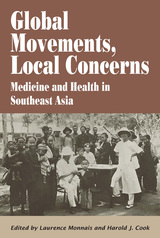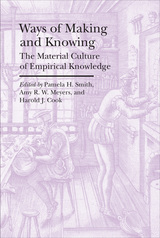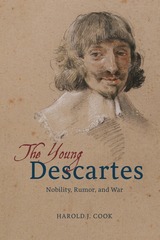3 books by Cook, Harold J.

Global Movements, Local Concerns
Medicine and Health in Southeast Asia
Edited by Laurence Monnais and Harold J. Cook
National University of Singapore Press, 2012
The development of medicine in Southeast Asia over the past two centuries has not been a simple imposition of European scientific medicine, but a complex and negotiated process that drew on Southeast Asian health experts, local medical traditions, and changing national and popular expectations. The contributors to this volume show how the practices of health in Southeast Asia over the past two centuries were mediated by local medical traditions, colonial interests, governments and policies, international interventions, and by a wide range of health agents and intermediaries. Their findings call into question many of the claims based on medicalization and biopolitics that treat change as a process of rupture. While governments, both colonial and national, instituted policies that affected large numbers of people, much health care remained rooted in a more interactive and locally-mediated experience, in which tradition, adaptation and hybridization is as important as innovation and conflict. "Semi-subaltern" Western-trained doctors and varied traditional healers, many of them women, were among the cultural brokers involved in the building of healthcare systems, and helped circulate mixed practices and ideas about medicine and health even as they found their place in new professional and social hierarchies in an era of globalization.
[more]

Ways of Making and Knowing
The Material Culture of Empirical Knowledge
Edited by Pamela H. Smith, Amy R. W. Meyers, and Harold J. Cook
Bard Graduate Center, 2017
Although craftspeople and artists often work with natural materials, the notion that making art can constitute a means of knowing nature is a novel one. This book, with contributions from historians of science, medicine, art, and material culture, shows that the histories of science and art are not simply histories of concepts or styles, but histories of the making and using of objects to understand the world. An examination of material practices makes it clear that the methods of the artisan represent a process of knowledge making that involves extensive experimentation and observation that parallel similar processes in the sciences. Ways of Making and Knowing offers a comprehensive and interdisciplinary history of the ways in which human beings have sought out, discovered, and preserved their own knowledge of the world around them; it has only been through material and human interaction with (and manipulation of) nature that we have come to understand it.
[more]

The Young Descartes
Nobility, Rumor, and War
Harold J. Cook
University of Chicago Press, 2018
René Descartes is best known as the man who coined the phrase “I think, therefore I am.” But though he is remembered most as a thinker, Descartes, the man, was no disembodied mind, theorizing at great remove from the worldly affairs and concerns of his time. Far from it. As a young nobleman, Descartes was a soldier and courtier who took part in some of the greatest events of his generation—a man who would not seem out of place in the pages of The Three Musketeers.
In The Young Descartes, Harold J. Cook tells the story of a man who did not set out to become an author or philosopher—Descartes began publishing only after the age of forty. Rather, for years he traveled throughout Europe in diplomacy and at war. He was present at the opening events of the Thirty Years' War in Central Europe and Northern Italy, and was also later involved in struggles within France. Enduring exile, scandals, and courtly intrigue, on his journeys Descartes associated with many of the most innovative free thinkers and poets of his day, as well as great noblemen, noblewomen, and charismatic religious reformers. In his personal life, he expressed love for men as well as women and was accused of libertinism by his adversaries.
These early years on the move, in touch with powerful people and great events, and his experiences with military engineering and philosophical materialism all shaped the thinker and philosopher Descartes became in exile, where he would begin to write and publish, with purpose. But though it is these writings that made ultimately made him famous, The Young Descartes shows that this story of his early life and the tumultuous times that molded him is sure to spark a reappraisal of his philosophy and legacy.
In The Young Descartes, Harold J. Cook tells the story of a man who did not set out to become an author or philosopher—Descartes began publishing only after the age of forty. Rather, for years he traveled throughout Europe in diplomacy and at war. He was present at the opening events of the Thirty Years' War in Central Europe and Northern Italy, and was also later involved in struggles within France. Enduring exile, scandals, and courtly intrigue, on his journeys Descartes associated with many of the most innovative free thinkers and poets of his day, as well as great noblemen, noblewomen, and charismatic religious reformers. In his personal life, he expressed love for men as well as women and was accused of libertinism by his adversaries.
These early years on the move, in touch with powerful people and great events, and his experiences with military engineering and philosophical materialism all shaped the thinker and philosopher Descartes became in exile, where he would begin to write and publish, with purpose. But though it is these writings that made ultimately made him famous, The Young Descartes shows that this story of his early life and the tumultuous times that molded him is sure to spark a reappraisal of his philosophy and legacy.
[more]
READERS
Browse our collection.
PUBLISHERS
See BiblioVault's publisher services.
STUDENT SERVICES
Files for college accessibility offices.
UChicago Accessibility Resources
home | accessibility | search | about | contact us
BiblioVault ® 2001 - 2024
The University of Chicago Press









